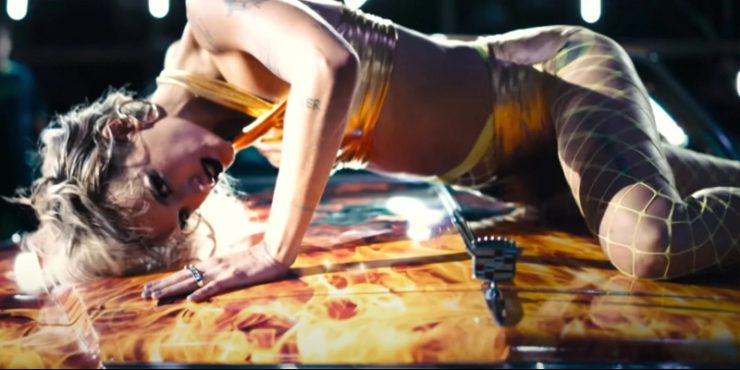What does it mean to make a connection? Empathy is probably the main ingredient, then understanding. Titane is a film about two people who – by some miracle – find each other when they need it most. One is a serial killer with a metal plate in her head who likes to have sexual relations with automobiles, the other is a fire fighter with a missing child and a problematic addiction to anabolic steroids. The oddity of their coming together (and let me tell you, no one could predict how it comes to be) is shown without much comment. Writer-director Julia Ducournau is a practitioner of the genre of body horror, but the icky details of her scenes and characters have little effect on the relationship they have with one another. In other words, this the her universe and we’re just watching it.
The first thirty minutes of Titane is such an unrelenting onslaught of unpleasant violence and graphic sexual proclivity. It is daring mainstream audiences to be turned off, to look away (I found myself watching fearfully through latticed fingers on more than one occasion). Alexia (a profoundly good Agathe Rousselle) is a dancer who specializes in stripteases atop flamboyant cars at auto shows. She has a plate in her head from a car accident when she was a young girl (she was annoying her dispassionate father from the back seat, and when he finally snapped, he spun out). The accident and the keepsake she got from it does not dissuade her from every day life. She’s successful at what she does; she has fans who come to her performances and ask for her autograph. But she also has a homicidal compulsion, which she executes with a chopstick-length hairpin which she plunges into the neck of her victims.
She’s performed a string of murders, enough to warrant the attention of the local news. Some were done in reaction to unwanted male attention, some for bloodlust. When she goes too far (that’s enough detail on the matter for now), she’s forced to go on the run, cutting her hair and wrapping her breasts to pass herself off as a boy. Not just any boy, but the missing child of Vincent (Vincent Lindon), an emotionally sensitive EMT who’s own son has been missing for decades. When Vincent sees Alexia – now posing as Adrien – he’s convinced that this is his lost child, and brings her home with him. It’s obvious that Vincent is wearing blinders, choosing not to see the obvious signs that Adrian is Alexia. She fills a painful void for Vincent that has been hurting for years, and she eventually repays his generosity with the parental intimacy he craves.
Early in the film, Alexia has sex with one of the cars in the showroom. The practical details are eschewed for general gyrating and motion, but it feels apparent that this is not the first time. The significance here is that soon after she realizes she’s been impregnated by the car which adds another twisted complication to her journey. It seems like a bit of a miracle to me that a film like Titane – which is chock full of such harrowing fucked-up-edness – can so successfully turn itself into a sincere, even moving story about the restorative power of trust and love. There’s never any sexual connection between Vincent and Alexia, but their bond is deep. It certainly isn’t like any mainstream parent-child relationship I’ve ever seen in a movie. Ducournau has a taste for the macabre (her first film, 2016’s Raw, was about a cannibal), but also a touch with emotion and humanity, even if the behavior doesn’t strike you as the most humane.
Titane won the Palme D’or at this year’s Cannes Film Festival, and jury head Spike Lee claimed it was mostly because there was so much in the film that they “hadn’t seen before”. I can’t argue with that. The film’s explicit imagery manages to avoid the nihilism of early Cronenberg, though the brutal spirit is still there. Rousselle and Lindon – both fully committed and both very good – make something out of this parade of blood, guts and eroticism. Generally speaking, Titane is not the kind of film that is usually “for me”, but I must confess to being persuaded by its unflinching portrayal of abuse and its consequences. That Ducournau seems less interested in metaphor and more interested in imprinting this imagery in your mind works much to the film’s benefit. It promises to be unlike anything you’ve ever seen and it delivers, for better or worse.
Written and Directed by Julia Ducournau










